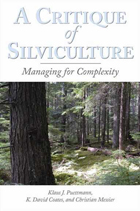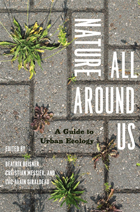2 books by Messier, Christian

A Critique of Silviculture
Managing for Complexity
Klaus J. Puettmann, K. David Coates, and Christian Messier
Island Press, 2008
The discipline of silviculture is at a crossroads. Silviculturists are under increasing pressure to develop practices that sustain the full function and dynamics of forested ecosystems and maintain ecosystem diversity and resilience while still providing needed wood products. A Critique of Silviculture offers a penetrating look at the current state of the field and provides suggestions for its future development.
The book includes an overview of the historical developments of silvicultural techniques and describes how these developments are best understood in their contemporary philosophical, social, and ecological contexts. It also explains how the traditional strengths of silviculture are becoming limitations as society demands a varied set of benefits from forests and as we learn more about the importance of diversity on ecosystem functions and processes.
The authors go on to explain how other fields, specifically ecology and complexity science, have developed in attempts to understand the diversity of nature and the variability and heterogeneity of ecosystems. The authors suggest that ideas and approaches from these fields could offer a road map to a new philosophical and practical approach that endorses managing forests as complex adaptive systems.
A Critique of Silviculture bridges a gap between silviculture and ecology that has long hindered the adoption of new ideas. It breaks the mold of disciplinary thinking by directly linking new ideas and findings in ecology and complexity science to the field of silviculture. This is a critically important book that is essential reading for anyone involved with forest ecology, forestry, silviculture, or the management of forested ecosystems.
The book includes an overview of the historical developments of silvicultural techniques and describes how these developments are best understood in their contemporary philosophical, social, and ecological contexts. It also explains how the traditional strengths of silviculture are becoming limitations as society demands a varied set of benefits from forests and as we learn more about the importance of diversity on ecosystem functions and processes.
The authors go on to explain how other fields, specifically ecology and complexity science, have developed in attempts to understand the diversity of nature and the variability and heterogeneity of ecosystems. The authors suggest that ideas and approaches from these fields could offer a road map to a new philosophical and practical approach that endorses managing forests as complex adaptive systems.
A Critique of Silviculture bridges a gap between silviculture and ecology that has long hindered the adoption of new ideas. It breaks the mold of disciplinary thinking by directly linking new ideas and findings in ecology and complexity science to the field of silviculture. This is a critically important book that is essential reading for anyone involved with forest ecology, forestry, silviculture, or the management of forested ecosystems.
[more]

Nature All Around Us
A Guide to Urban Ecology
Edited by Beatrix Beisner, Christian Messier, and Luc-Alain Giraldeau
University of Chicago Press, 2012
It’s easy to stand in awe of a city’s impressive skyline, marveling at its buildings reaching for the clouds and its vast network of roadways and train lines crisscrossing in every direction. It can often seem like everything in a city is man-made, all concrete, steel, and glass. But even the asphalt jungle is not all asphalt—a sidewalk’s cracks are filled with nature, if we know where and how to look. To aid us in this quest is Nature All Around Us, which will help us to recognize (and look after) the natural world we traipse through in our daily lives.
Nature All Around Us uses the familiar—such as summer Sundays humming with lawn mowers, gray squirrels foraging in planters, and flocks of pigeons—in order to introduce basic ecological concepts. In twenty-five short chapters organized by scale, from the home to the neighborhood to the city at large, it offers a subtle and entertaining education in ecology sure to inspire appreciation and ultimately stewardship of the environment. Various ecological concepts that any urban dweller might encounter are approachably examined, from understanding why a squirrel might act aggressively towards its neighbor to how nutrients and energy contained within a discarded apple core are recycled back into the food chain. Streaming through the work is an introduction to basic ecology, including the dangers of invasive species and the crucial role played by plants and trees in maintaining air quality.
Taken as a whole, Nature All Around Us is an unprecedented field guide to the ecology of the urban environment that invites us to look at our towns, cities, and even our backyards through the eyes of an ecologist. It is an entertaining, educational, and inspiring glimpse into nature in seemingly unnatural settings, a reminder that we don’t have to trek into the wild to see nature—we just have to open our eyes.
[more]
READERS
Browse our collection.
PUBLISHERS
See BiblioVault's publisher services.
STUDENT SERVICES
Files for college accessibility offices.
UChicago Accessibility Resources
home | accessibility | search | about | contact us
BiblioVault ® 2001 - 2024
The University of Chicago Press









